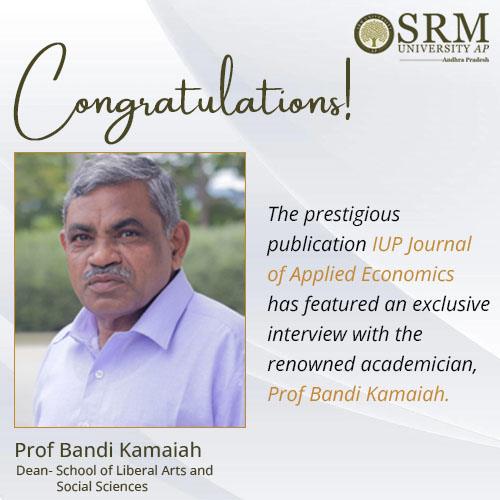
‘An interview with Professor Bandi Kamaiah’ was featured in the leading publication, IUP Journal of Applied Economics. Analysing the issues of Micro, Macro, Development and Energy economics, the journal features papers on Industrial economics, Public finance, Industry, Agricultural, Rural economics, etc. Having published interviews with eminent Professors like Professor K L Krishna, Professor Dilip Nachane, Professor U Sankar, Professor S Mahendra Dev, and Professor Ashima Goyal, the dialogue with Prof Bandi Kamaiah is the sixth in the series.
In the interview with Prof Bandi Kamaiah, Department of Economics, SRM University-AP, GRK Murty narrates the transformational journey of Prof Kamaiah from the son of a tenant farmer to an estimable researcher who went on to occupy the position of the President of ‘The Indian Econometric Society’ (TIES). The interview presents an enriching account of the veteran’s life who crossed innumerable hurdles to nurture his passion and became an ‘agent of change’ in the lives of several hundreds of first-generation students from the margins of society, by shaping them into accomplished professionals.
The evocative dialogue with Prof Kamaiah extends an open doorway to several inspiring phases of his life that modelled him into a “towering intellectual” and “outstanding teacher”. His collaboration with pre-eminent economists like Prof P R Bramhananda, Prof Dilip Nachane, and Prof C Rangarajan motivated him to build a career in monetary economics. He has successfully guided 50 PhDs and an equal number of MPhil dissertations from almost every facet of economics and published more than 160 papers in national and international journals.
The interview explicates his association with various institutes of prestige including the National Institute of Bank Management (NIBM), Indira Gandhi Institute of Development Research (IGIDR) and the University of Hyderabad. As the founding father of the School of Economics at the University of Hyderabad, he has also introduced a two-year employment-enhancing master’s program in Financial Economics. His amicable and free-spirited approach made him one of the most sought-after teachers among the student community. He has a unique way of nurturing students and guiding them through the process of academic research.
Prof Kamaiah also articulates his views on the economic landscape of the country, the possible impact of its monetary and fiscal policies in the post-pandemic scenario, the growing correlation between the domestic and global stock markets, and the deepening relationship between energy consumption, real GDP, CO2 emissions, and such other climate-related issues. Airing his concerns about the outmoded syllabus and stagnant curriculum, he reiterates the need to renovate university education, hopefully, through the framework created by NEP 2020. He believes, creating specialised institutions would be a better way to train professionals who would become market ready and employable.
In his opinion, ‘Centres of Economic Excellence’ in different regions of the country will give rise to a strong pool of economists well-trained within the country to meaningfully replace the imported economists from the West to render advice on crucial matters. “The young minds of the country should be exposed to indigenous ways of thinking, and holistically trained to appreciate our culture, resources and institutions, systems and customs, ways of living, etc. to understand local markets, expose the basis of vulgar consumerism, the beauty of self-regulation without the aid of Adam Smith’s invisible hand, and social realism in contrast to self-interest”, said Prof Kamaiah.

